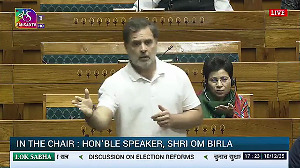Supreme Court committees have suggested stringent action against the organisers of events which lead to vandalism and damage to public property during strikes and political rallies.
Two committees -- headed by a former apex court judge K T Thomas and senior advocate Fali S Nariman -- submitted their detailed reports before a bench headed by Justice Arijit Pasayat.
Two proposals -- one for strengthening the provisions of Pervention of Damage to Public Properties Act, 1984, and the other making the leaders accountable for acts of vandalism during agitation -- are the focal points of the reports of the two committees, a senior advocate in the committee said.
The committees were formed following the destruction of public property during the agitation by the Gujjars demanding Scheduled Tribes status in 2007.
While the Justice Thomas committee suggested measures on the strict compliance of the act, the Nariman committee has dealt with the issue of media coverage on strikes with specific reference to television coverage focusing on the agitators indulging in vandalism.
The Nariman committee has suggested that leaders of the agitation should be made absolutely liable for the destruction of properties by their supporters and there should be self-regulation on the part of the media.
The bench said the two committees have given very important suggestions that need to be seriously deliberated upon.
It asked all the state governments and union territories to respond or give suggestions to the reports by February and posted the matter for further hearing on March 17.
The Justice Thomas committee included Solicitor General G E Vahanvati, former Central Burau of Investigation director R K Raghavan, senior advocate K Parasaran and officers of the home and law and justice ministries.
Noting that though the Prevention of Damage to Public Property Act was enacted in 1984, the apex court said hardly 24 cases have been registered in the country during its existence, indicating that it is not being enforced strictly by the government.





